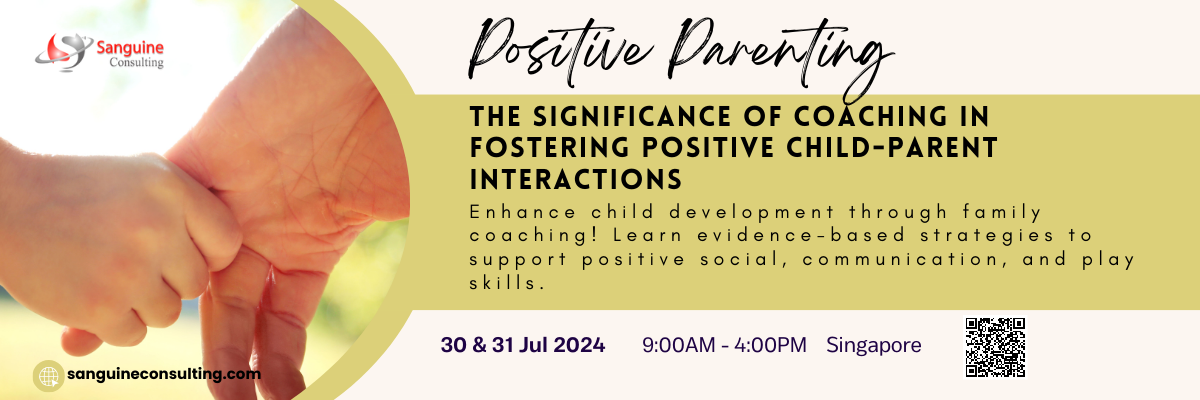
Workshop Title
Positive Parenting: The Significance of Coaching in Fostering Positive Child-Parent InteractionsWhen
Asia/Singapore
Where
Singapore, (exact venue to be advised)
Event Tag
Evidence suggests that coaching caregivers leads to positive learning outcomes for children as opposed to direct contact between the practitioner and child (Roggman et al, 2016). Furthermore, research supports the association of positive social emotional benefits among both children and their caregivers when caregivers are coached in responsive interaction skills (Dunst et al., 2007; Dunst & Kassow, 2008; Powell & Dunlap, 2010). In this framework, the role of the practitioner is to promote the confidence and competence of the caregiver. The practitioner uses evidence-based coaching strategies to support the caregiver’s responsivity towards their child’s cues and communicative intentions to create responsive parent-child interactions. Through the use of family-centered, evidence based coaching strategies (Fettig & Barton, 2014), the practitioner supports the caregiver in having the confidence and competence to embed learning throughout daily routines and activities to support their child’s social emotional development (Jung, 2003; McWilliam, 2010; Rush & Shelden, 2011).
Objectives
Participants will be able to:
- Communicate the Importance of Coaching Families to Support Young Children
- Explain the Rationale for Emphasizing Social, Communication, and Play Skills while Reducing Challenging Behaviors
- Demonstrate Effective Coaching Strategies for Families
Outline
Day 1:
- Introductions
- Clearly articulate the rationale behind the necessity of coaching families in supporting their young children.
- Highlight the long-term benefits of family involvement in a child’s development, emphasizing the positive impact on the child’s social, emotional, and cognitive growth.
- Provide evidence-based research and examples to illustrate the effectiveness of family coaching in enhancing children’s overall well-being.
- Building relationships with families
- Effective communication strategies
- Outline the critical role of social, communication, and play skills in a child’s development and future success.
- Present the negative consequences of unaddressed challenging behaviors and their potential impact on the child’s social relationships and academic performance.
- Provide compelling evidence and real-world examples to support the argument for focusing on positive skills development and behavior reduction strategies.
Day 2:
- Describe dyadic interactions and their importance
- Introduce a range of coaching strategies that are proven to be effective in working with families.
- Offer practical tips and techniques for building a strong coach-family relationship.
- How to use family coaching to support child-caregiver interactions
- How to support the family in embedding across routines
- Supporting the family in using positive parenting strategies to prevent challenging behavior
- Provide case studies and examples that showcase successful implementation of coaching strategies, emphasizing positive outcomes for both the child and the family.
Trainer’s Profile
Dr. E. Barton, PhD, BCBA-D, is an international educational consultant. She taught graduate-level courses on evidence-based assessment and intervention practices for young children with disabilities and single case research design. She is a Board Certified Behavior Analyst and directs research projects related to evidence-based practices for young children, policies and practices that support high quality inclusion, and effective professional development systems. Dr. Barton is an active scholar and practitioner with over 120 publications in major journals, multiple chapters, and several textbooks related to evidence-based practices. Dr. Barton serves on several editorial boards and is the Editor-in-Chief of Topics in Early Childhood Special Education and an Associate Editors for the Journal of Early Intervention and Remedial and Special Education. She has received many honors including as the 2021 Peabody Faculty Excellence Award: Service to Students and 2020 Chancellor’s Faculty Fellow at Vanderbilt University. She also was honored with the 2019 Merle B. Karnes Award for Service to the Division for Early Childhood and the 2017 Distinguished Early Career Research Award from the Division for Research of the Council for Exceptional Children.
Methodology
This workshop offers multiple engagement opportunities, including high quality didactic instruction and collaborative learning practices. Participants will have the opportunity to engage in small and large group discussion, self-reflection, and action planning.
Target Audience
Teachers, counselors, administrators, and other school staff that support students ages 2 – 8.
Fees
1 person: SGD1190.00/person
2 to 4 person: SGD1090.00/person
5 person & more: SGD890.00/person
Venue
Singapore (exact location to be advised)
Information on Entering Singapore Requirements
Other Details
Duration: 2 days, 12 hours
Closing Date: 1 Jun 2024
See also Other Upcoming Workshops …
Other Available Sessions
- From Chaos to Calm: Managing Behavior through Executive Function in the Classroom - 11 Jul 2024 - 12 Jul 2024 - 7:00 pm - 10:00 pm - Online
- Evidence-Based Instructional Practices for Autism Spectrum Disorder - 16 Jul 2024 - 17 Jul 2024 - 7:00 pm - 10:00 pm - Online
- Positive Parenting: The Significance of Coaching in Fostering Positive Child-Parent Interactions - 30 Jul 2024 - 31 Jul 2024 - 9:00 am - 4:00 pm - Singapore
- Preventing and Addressing Challenging Behaviors in Young Children - 1 Aug 2024 - 2 Aug 2024 - 9:00 am - 4:00 pm - Singapore
- Creating Connections: Building Nurturing and Responsive Relationships with Young Children - 24 Sep 2024 - 25 Sep 2024 - 7:00 pm - 10:00 pm - Online
